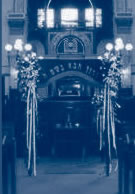|
SEDRA : Toledot: Hertz Chumash p. 93 Genesis
Chapter 25 Verse 19
This week's Sedra is generously sponsored by David Reichenberg
SYNOPSIS:
Isaac and Rebecca suffered childlessness for the first twenty years of marriage. Their prayers were eventually answered when Rebecca became pregnant with twins. Rebecca experienced a very difficult pregnancy. Her pleas to G-d were answered in a prophetic announcement that she would have twin sons of very different personality and that the "older will serve the younger". On birth the older was named Esau for his hairy appearance, and the younger Jacob because he emerged with his hand grasping the ankle (akev) of his brother.
As they grew, differences in their personalities became more marked. Esau was an outdoor man, a hunter; Jacob was studious. On returning from a hunt one day, ravenous Esau implored Jacob to give him the lentil soup he was cooking. Jacob agreed on condition that Esau first surrender to him his privileges as a first-born. Considering these privileges as of nebulous value, Esau agreed without hesitation.
A famine caused Isaac to move his dwelling place. G-d prevented Isaac from going to Egypt (as Abraham had done) and renewed His Covenant originally made with Abraham. Isaac then settled near Avimelech and the Philistines in Gerar. Following his father's custom, he passed off Rebecca as his sister in order to avoid the danger of attacks upon himself. Avimelech discovered the truth, remonstrated with Isaac, and took steps to ensure his safety.
Isaac prospered greatly, earning the enmity of his jealous neighbours. He moved on, but his neighbours resentfully blocked all Abraham's wells which Isaac had reopened after they had been blocked following Abraham's death. Isaac settled in Beersheba where Avimelech and Phichol his general came to visit him. When Isaac protested that they had hatefully driven him out Avimelech replied that they now realised he is the "blessed of the Lord". Esau then married a Hittite girl causing his parents much anguish.
Isaac had grown old and blind and felt that the time had come to bless his eldest son before his death. He therefore requested that Esau go to the field to hunt and prepare the game he captured as a tasty dish, so that Isaac could partake of it and then bless him. Rebecca, overhearing the conversation, dressed Jacob in Esau's clothing, covered his hands and neck with goat-skin to make him as hairy as Esau, and sent him to Isaac bearing a tasty dish of young goat's meat and bread which she made. Jacob's voice aroused Isaac's suspicions, but they were allayed when he felt Jacob's hairy hands that Isaac was sure belonged to Esau.
Isaac called Jacob forward and he kissed his father. Isaac blessed Jacob saying, "May Hashem give you of the dew of the Heavens and the fat of the land, and abundant grain and wine. Nations shall serve you and kingdoms shall bow down to you. Those who curse you shall be cursed and those who bless you shall be blessed".
No sooner had Jacob left than Esau returned and the truth was discovered. However, Isaac did not revoke his blessing to Jacob. Instead, he agreed to bless Esau as well and foretold that Esau's future descendants would live by the sword and would serve Jacob's descendants as long as the latter were faithful to G-d. However, were the descendants of Jacob to stray from the path of the Torah, Esau's descendants would break out of this servitude.
Esau was devastated at Jacob's ruse and plotted to kill his brother as soon as their father died. To avert disaster Rebecca instructed Jacob to leave home to stay with her brother, Lavan, in Charan. Isaac concurred and expressed the wish that Jacob choose a wife from among his uncle's family. Isaac then blessed Jacob again so that G-d=s blessings of Abraham be fulfilled through Jacob and his descendants and that he inherit the land of Canaan. After Jacob had left Beersheba, Esau tried to please his parents by marrying a daughter of Yishmael.
TELL ME RABBI ... THE YIHUD-SECLUSION ROOM
After the chuppah, the bride and groom proceed to the Yihud (seclusion). It is customary for bride and groom to be alone for a period of time immediately following the marriage ceremony. The complete seclusion of the couple in a closed room is the completion of the chuppah and is a public act symbolising their new status as husband and wife. Since this act, more than any other, signifies that they are truly married, a public awareness of their seclusion is required, and it must be attested to by qualified witnesses. The witnesses remain outside the door to ensure that no one
enters until the couple have been alone for a reasonable period of time.
Yihud provides a period of respite for the newly married couple, an interval of tranquillity for them to enjoy together in total solitude amidst the turmoil of the wedding. It is customary for the two to have their first meal as husband and wife together in the Yihud room. Both will have been fasting all day, and this food will be their first of the day. It is important that the Yihud room be prepared before the wedding. It should provide absolute privacy.
EARLY SHABBAT
During the summer months our congregation "takes Shabbat early" to accommodate most families who prefer to eat their Friday night meal at a reasonable hour. The rule is that we may not bring in Shabbat till after Plag Mincha, that is 1 ¼ relative or "halachic" hours before sunset.
An halachic hour is one twelfth of the day, calculated from sunrise to sunset. In Melbourne relative or "halachic" hours may be up to 74 real minutes.
We do not fulfil the obligation of the nighttime Sh'ma if it is said before sunset. Therefore early daveners must repeat the Sh'ma after 'stars-out'.
We light candles after PLAG, never before.
In our Shule we have worked out that we cannot recite "Barchu" (Artscroll p330) before 7:10 for much of the Daylight Saving period.
Thus our regular Summer starting time is Mincha followed by Kabbalat Shabbat and Maariv for Shabbat from 6:30 pm
The extremities of Shabbat are far greater in many European countries. The revered Rabbi Yisroel Salanter in Lithuania insisted in accepting Shabbat early in his Congregation. This was out of deference to those homemakers who had worked so hard all Friday to prepare for Shabbat so that they would not have to wait around too long in their exhaustion till serving up the tasty results of their noble efforts
BACK TO SHABBAT SHALOM
TABLE
|








